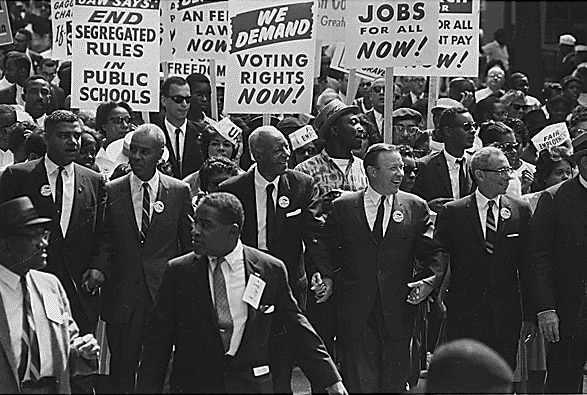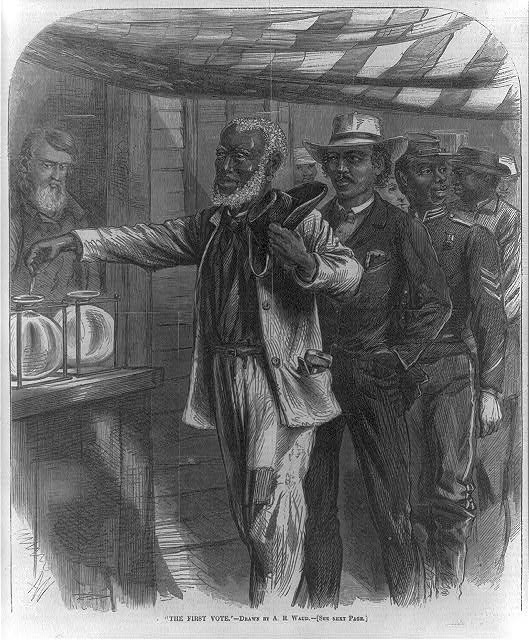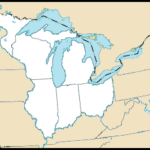The Civil Rights Act of 1964 is one of the landmark pieces of legislation that defined the years following its passage. However, the legacy of this piece of legislation is complex. Read on to learn more about this monumental policy for the APUSH exam.
What did the Civil Rights Act do?
The Civil Rights Act of 1964 sought to undo the damage of Jim Crow policies, outlawing segregation in public spaces and employment discrimination on the basis of race, color, sex, religion, or national origin – commonly referred to as “protected classes” in legal debates.
I wrote a post about the Great Migration that helps put the Civil Rights Act into context. As African Americans fled the brutal (politically and physically) policies in the South, they found de facto policies of segregation in the North and West, including redlining and restrictive covenants that limited their ability to buy a home and get a piece of the American Dream.
This sense of irony – the place that courted black labor was just as segregated and violent as the place they had left – was a large motivator for the Civil Rights Movement. The Civil Rights Act, and the Voting Rights Act of 1965, were concrete pieces of legislation that were intended to make the ideals of American democracy real for African Americans.

How did the Civil Rights Act get passed into law?
If you need a refresher on how bills become law, I suggest you check out one of my favorite videos from Schoolhouse Rock: ‘I’m just a Bill.’ (I also dare you not to have it stuck in your head for the rest of the week.) I’m just going to give you some of the specifics about this particular bill.
Lyndon B. Johnson, Democratic successor to JFK, threw his political weight behind the bill. Some doubted the wisdom behind this move following the assassination of JFK the November before; Senator Richard Russell, Jr., (D-GA) went so far as to threaten that Johnson’s support “[would] not only cost [him] the South, it will [him] you the election.” By votes of 290-130 in the House and 72-27 in the Senate, the Civil Rights Act became law on July 2, 1964.
What happened after the Civil Rights Act was law?
However, the work of the Civil Rights Movement was not done. Activists throughout the South – notably Fannie Lou Hamer, a Mississippi Freedom Democratic Party organizer – put the Democratic Party under considerable pressure to address the realities of life in the Jim Crow South (a recognition that would make former Dixiecrats abandon the Democratic party up until today).
See Fannie Lou Hamer speak at the 1964 Democratic Convention
And Bloody Sunday, the infamous violence that was broadcasted nationally where a biracial group of activists marched from Selma, AL to the state capitol to protest for voting rights, only forced the hand of the Democratic Party further. The Voting Rights Acts of 1965 was passed later on in that same year; the Fair Housing Act of 1968, the last of the major legislation of the Civil Rights Movement, prohibited housing discrimination based on the protected classes.
Is this legislation from the Civil Rights Movement around today?
To answer that question, I have to tell you a little bit about a particular component of the Voting Rights Act of 1965. Section 5 of the Voting Rights Act (VRA) ensured that areas that had historically been the most egregious violators of the 15th amendment – remember: the 15th amendment states that the right to vote should not be denied based on race and other protected classes – would have to check with the Supreme Court to make sure any changes to their voting laws were not discriminatory. Those areas were determined by something called a “coverage formula.”
In the 2013 case of Shelby County v. Holder, the Supreme Court ruled that the coverage formula was unconstitutional, thereby removing most of the enforceability of the Voting Rights Act of 1965.
The Civil Rights Act of 1964 and its later iterations still exist, albeit with varying degrees of oversight.
Here’s a short overview of the three landmark cases:
Civil Rights Act of 1964: outlawed segregation in public places and employment discrimination based on race, color, sex, religion, and national origin (aka protected classes)
Voting Rights Act of 1965: outlawed voter intimidation and other discriminatory policies, but was effectively made defunct through Shelby County v. Holder (2013)
Fair Housing Act of 1968: prohibited discrimination in housing based on race, religion, national origin, and sex.
What kind of questions will I be asked on the APUSH exam about the Civil Rights Act?
Use the two excerpts below to answer the question. Excerpts are from Stanford History Education Group.
“We face, therefore, a moral crisis as a country and as a people…It cannot be left to increased demonstrations in the streets…It is time to act in the Congress, in your State and local legislative body and, above all, in all of our daily lives. But there are other necessary measures which only the Congress can provide….In too many communities, in too many parts of the country, wrongs are inflicted on Negro citizens and there are no remedies at law. Unless the Congress acts, their only remedy is in the street.”
John F. Kennedy, Speech promoting the Civil Rights Act of 1964 on June 11, 1963
“We march for jobs and freedom, but we have nothing to be proud of, for hundreds and thousands of our brothers are not here. They have no money for their transportation, for they are receiving starvation wages, or no wages at all. In good conscience, we cannot support wholeheartedly the administration’s civil rights bill, for it is too little and too late. There’s not
one thing in the bill that will protect our people from police brutality…”
SNCC Chairman John Lewis’s Speech March on Washington, August 1963
Answer (a), (b), and (c) .
(a) What problem does John F. Kennedy believe the Civil Rights Act will solve?
(b) What problem does John Lewis see with the Civil Rights Act of 1964?
(c) Cite ONE event from history that would support John Lewis’s view.
Possible answers:
(a) – Protesters demonstrating in the street because they have no legal recourse.
(b) -The Act would be ‘too little too late’.
(c) -The Jim Crow Laws and other de facto segregation policies killed many African Americans.
Want to learn more about this important period in history? Check out this interview!





Leave a Reply